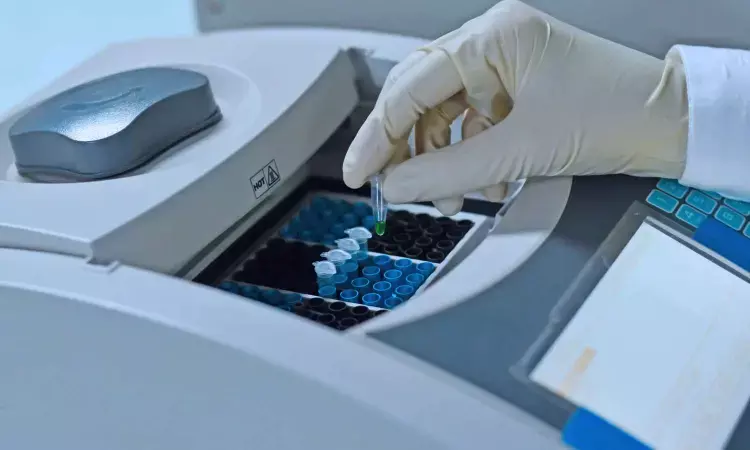- Home
- Medical news & Guidelines
- Anesthesiology
- Cardiology and CTVS
- Critical Care
- Dentistry
- Dermatology
- Diabetes and Endocrinology
- ENT
- Gastroenterology
- Medicine
- Nephrology
- Neurology
- Obstretics-Gynaecology
- Oncology
- Ophthalmology
- Orthopaedics
- Pediatrics-Neonatology
- Psychiatry
- Pulmonology
- Radiology
- Surgery
- Urology
- Laboratory Medicine
- Diet
- Nursing
- Paramedical
- Physiotherapy
- Health news
- Fact Check
- Bone Health Fact Check
- Brain Health Fact Check
- Cancer Related Fact Check
- Child Care Fact Check
- Dental and oral health fact check
- Diabetes and metabolic health fact check
- Diet and Nutrition Fact Check
- Eye and ENT Care Fact Check
- Fitness fact check
- Gut health fact check
- Heart health fact check
- Kidney health fact check
- Medical education fact check
- Men's health fact check
- Respiratory fact check
- Skin and hair care fact check
- Vaccine and Immunization fact check
- Women's health fact check
- AYUSH
- State News
- Andaman and Nicobar Islands
- Andhra Pradesh
- Arunachal Pradesh
- Assam
- Bihar
- Chandigarh
- Chattisgarh
- Dadra and Nagar Haveli
- Daman and Diu
- Delhi
- Goa
- Gujarat
- Haryana
- Himachal Pradesh
- Jammu & Kashmir
- Jharkhand
- Karnataka
- Kerala
- Ladakh
- Lakshadweep
- Madhya Pradesh
- Maharashtra
- Manipur
- Meghalaya
- Mizoram
- Nagaland
- Odisha
- Puducherry
- Punjab
- Rajasthan
- Sikkim
- Tamil Nadu
- Telangana
- Tripura
- Uttar Pradesh
- Uttrakhand
- West Bengal
- Medical Education
- Industry
A 5-minute PCR, faster than self-diagnosis kits

PCR technology is a molecular diagnostics technology that detects target nucleic acids by amplifying the DNA amount. It has brought marked progress in the life sciences field since its development in 1984. This technology has recently become familiar to the public due to the COVID-19 pandemic, since PCR can detect nucleic acids that identify the COVID-19 virus. However, due to the technical nature of the PCR test, results cannot be immediately delivered. It takes at least 1 to 2 hours for the test as it requires repeated temperature cycles (60~95℃).
Dr. Sang Kyung Kim (Director) and Dr. Seungwon Jung’s research team at the Center for Augmented Safety System with Intelligence, Sensing of the Korea Institute of Science and Technology (KIST, President: Seok Jin Yoon) announced that they had developed an ultrafast PCR technology. By using photothermal nanomaterials, the ultrafast PCR shortens the test time by 10-fold, compared with the time taken for the existing test. The new method is completed in 5 minutes, with diagnostic performance equal to that of the existing test method.
Photothermal nanomaterials generate heat immediately upon light irradiation. As such, photothermal nanomaterials rapidly increase in temperature, but it is difficult to maintain performance due to their low stability. The KIST research team has developed a polymer composite that physically holds photothermal nanomaterials and can overcome their instability. By applying it to a PCR system, they have successfully developed a compact PCR system without a heat plate. In addition, they implemented a multiplex diagnostic technology that detects several genes at once, enabling it to distinguish several types of COVID-19 variants in a single reaction.
Director Sang Kyung Kim states, “through additional research, we plan to miniaturize the developed ultrafast PCR technology this year, to develop a device that can be utilized anywhere. While maintaining the strength of PCR as an accurate diagnostic method, we will increase its convenience, field applicability, and promptness, by which we expect that it will become a precision diagnostic device that can be used at primary local clinics, pharmacies, and even at home. In addition, PCR technology is a universal molecular diagnostic technology that can be applied to various diseases other than infectious diseases, so it will become more applicable.”
Reference:
Bong Kyun Kim, Sang-A Lee, Minju Park, Eui Ju Jeon, Mi Jung Kim, Jung Min Kim, Heesuk Kim, Seungwon Jung, and Sang Kyung Kim ACS Nano 2022 DOI: 10.1021/acsnano.2c07017
Dr Kamal Kant Kohli-MBBS, DTCD- a chest specialist with more than 30 years of practice and a flair for writing clinical articles, Dr Kamal Kant Kohli joined Medical Dialogues as a Chief Editor of Medical News. Besides writing articles, as an editor, he proofreads and verifies all the medical content published on Medical Dialogues including those coming from journals, studies,medical conferences,guidelines etc. Email: drkohli@medicaldialogues.in. Contact no. 011-43720751


